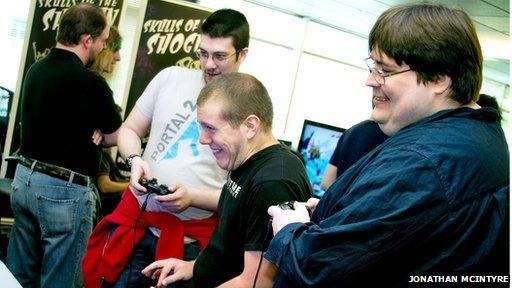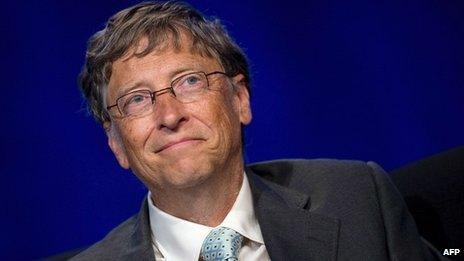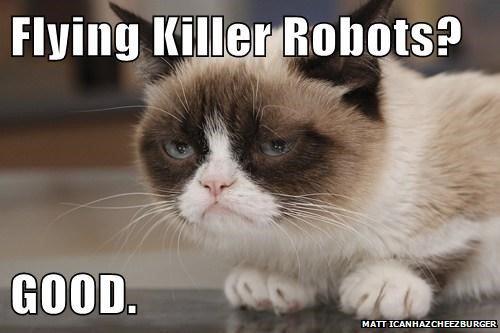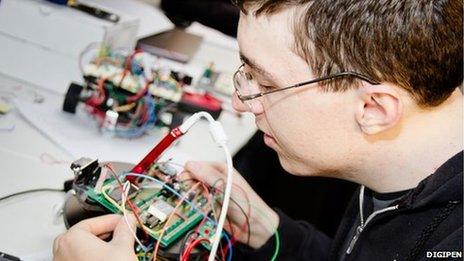Next Silicon Valleys: Seattle lures in a new generation
- Published
Seattle is home to the world's first video game university Digipen - will that help make it the next Silicon Valley?
When it comes to technology, Seattle punches above its weight. Amazon is based there and Microsoft's nearby, helping spur a vibrant tech cluster. In the second in our Next Silicon Valleys series, Richard Taylor visits the seaport city to see how it compares with its Californian counterpart.
Claude Comair smiles wryly. And with good reason: Digipen, the pioneering "video gaming university" he founded 25 years ago is buzzing.
Today, some 1,500 aspiring undergraduates are beavering away quietly on video gaming projects; some in the capacious open-plan studio, others assiduously taking notes in lectures as diverse as artificial intelligence and character modelling.

Digipen is teaching gaming to the next generation
But now Digipen has its gaze firmly trained on farther horizons, on nurturing the next generation of video gamers.
Next year Comair plans to open up the college to children, from as young as five up to 12-year-olds.
Unconventional? Yes, but Comair is unapologetic."A game is an aspect of being human. And entertaining ourselves is something we need on a daily basis," he tells the BBC.
Richard Taylor, the BBC's North America Technology Correspondent, talks to Claude Comair, founder of the DigiPen Institute of Technology
"Playing a game is a series of problem-solving events."
Digipen's idea is to build upon the foundations it established with a summer programme developed a decade ago, where kids spend half their time learning a regular curriculum and the other half focusing on tech, maths and science subjects.
The end game is to equip them with the rigorous skillset necessary to turn them into the next generation of game designers.

Seattle has become synonymous with the rise of video gaming
In most parts of the world, such a radically progressive attitude towards gaming would be sneered at, decried as irresponsible and unhealthy.
But this is greater Seattle, the largest city in the liberal state of Washington.
Start-up city
The region has become synonymous with the rise and rise of the video gaming industry, today playing host to about 350 interactive entertainment companies.
Some, like Valve, external, focus purely on hardcore gaming.
Others, like the quirky Icanhascheezburger, external, are proving a YouTube sensation, with viral videos based on hilarious animal antics.
Seattle's start-up scene is creating ripples far beyond too. Need a reliable contractor to repair your roof?
Serial entrepreneur Matt Ehrlichman saw a gaping hole in the $1bn (£600m) home improvement market, and successfully funded Porch, external, a network that provides a vetted list of contractors to get domestic projects completed reliably.
For cancer suffers, another start-up, Presage, external, takes a uniquely modern approach to understanding how a person's tumour responds to drugs, administering micro-doses of different drugs and measuring a patient's reaction, rather than the blunt approach of subjecting them to larger, more toxic doses of drugs which may cause side effects without any benefit.
As well as these consumer-facing entities, many of Seattle's emerging companies are focused on moving business operations online to the cloud, mirroring a wider global trend.
Bill Gates legacy
Others still are developing mobile apps and services.

Microsoft founder Bill Gates is a Seattle native
That's little wonder given the area's rich software heritage, which has cast a long shadow over the region ever since Seattle natives Bill Gates and Paul Allen relocated Microsoft, external here in 1979.
And two decades ago, Jeff Bezos began his giant e-commerce operation Amazon, external just down the road from Bill Gates's empire.
Despite the presence of these two tech giants, start-ups say it's easy to find capable employees.
Emily Huh is co-founder of the Cheezburger network, the firm responsible for spreading thousands of cat-themed photos overlaid with laugh-out-loud text and many of the viral video hits that litter your Facebook page.
She says employers generally find it a lot easier to build a business here rather than in states such as California or New York.
"There's a huge pool of talent for us to choose from. And it's just a great small community that's really supportive of each other."

Grumpy cat and the Lolcat meme come from Seattle
There's no doubt the area now has the raw ingredients for a healthy ecosystem: a recent study ranked Seattle fourth globally on a range of measures, from availability of talent to a support network.
Taking a risk
Nevertheless, Seattle is still finding its entrepreneurial feet.
Local investor Chris De Vore mentors start-ups trying to get off the ground. He complains that funding is in short supply - and that Seattle lacks the pioneering DNA and risk-taking attitude it needs if it is to live up to its potential.
"You need to have a culture where instead of people thinking when they get out of college, 'I'm going to get a job in a big company', the instinct has to be, 'I'm going to build a big company.' In Silicon Valley that's what you really have."

Many Seattle firms are focused on developing new mobile apps
And rewiring that impulse is no mean feat. It's this intangible mindset that ultimately presents the widest gulf between Seattle and Silicon Valley.
The latter is imbued with a community of dream-seekers drawn from the world over. Seattle's outdoor-loving, coffee-imbibing workforce have a more laid-back attitude to life. The area has undoubtedly laid the foundations of innovation.
But to steal the crown from Silicon Valley? That may take generations.
- Published3 September 2013
- Published26 November 2013
- Published17 October 2013
- Published27 August 2010